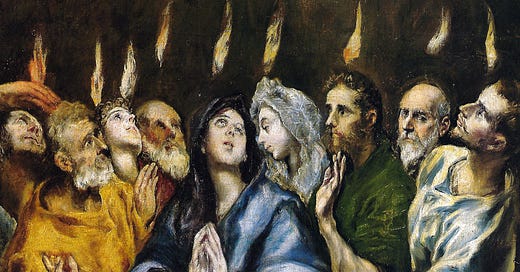In his homily given this past Pentecost Sunday, the day Christians celebrate the descent of the Holy Spirit upon the apostles gathered in the Upper Room, Pope Leo XIV repeatedly insists that “The Spirit opens borders.” Likewise, he adds, “The Spirit breaks down barriers and tears down the walls of indifference and hatred.” Despite the apparent political connotations of his message—the references to borders and walls suggesting efforts to restrict the movement of migrants and refugees—some Catholics took to social media to claim that Pope Leo was not promoting “open borders” in the political sense but rather was speaking spiritually.
Indeed, Leo does begin by stating that “The Spirit opens borders . . . in our hearts” and explaining that the Spirit brings about our spiritual transformation. But the apolitical interpretation of Leo’s homily is belied by the fact that, near the end of the homily, he counsels that, “Where there is love, there is no room for prejudice, for ‘security’ zones separating us from our neighbors, for the exclusionary mindset that, tragically, we now see emerging also in political nationalisms.” Clearly, the implication is that policies focused on hardening borders and building walls motivated by political nationalism are motivated by fear rather than love.
Immediately before his criticism of political nationalism, Leo says that the Spirit “opens borders between peoples.” Echoing Pope Francis’s encyclical Fratelli Tutti (which has quite a bit to say about the dignity of migrants and the dangers of nationalism) he states that:
Whenever God’s “breath” unites our hearts and makes us view others as our brothers and sisters, differences no longer become an occasion for division and conflict but rather a shared patrimony from which we can all draw, and which sets us all on journey together, in fraternity.
In distinction to those offering an apolitical interpretation to avoid the practical implications of Leo’s homily, other Catholics who criticized the pope for promoting “open borders” at least managed to interpret the point of Leo’s message correctly.
That being said, it would be a mistake to reduce Leo’s homily to a political message. There has been a strange effort to enlist Pope Leo as a partisan in our polarized culture wars, even to the point of inventing fake quotations or creating AI-generated “deep fake” videos. Those in the first group I described are at least correct that Leo is addressing a problem that runs deeper than politics.
The peace activist and former Jesuit priest John Dear writes in his book Living Peace that, after several years of engaging in nonviolent activism, he realized that there was still a kind of violence remaining in his heart in the form of hatred for those responsible for war and the stockpiling of nuclear weapons. He concluded that his nonviolence would not be fully faithful to the Gospel until he became open to peace in his own heart.
Pope Leo is making a similar point in his homily. Authentic social transformation must begin with the Spirit working in our hearts. The Spirit, according to Leo, “breaks down our hardness of heart, our narrowness of mind, our selfishness, the fears that enchain us and the narcissism that makes us think only of ourselves.” In what appears to be a nod to Thomas Merton, he adds, “He [i.e., the Spirit] puts us in touch with our inmost self, beneath all the masks we wear.”
Keep reading with a 7-day free trial
Subscribe to Window Light to keep reading this post and get 7 days of free access to the full post archives.





